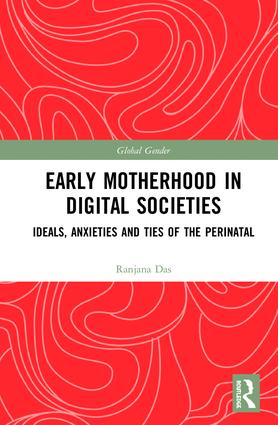By Ranjana Das
Christmas 2019 saw the release of my new Routledge monograph – Early Motherhood in Digital Societies: Ideals, Anxieties and Ties of the Perinatal. The book uses material from interviews with new mothers, and from a range of online sites, to offer an understanding of what the digital turn has meant for new mothers in an intense and critical period before and after they have a baby, often called the ‘perinatal’ period. The foreword to this book, penned by Shani Orgad, author of Heading Home, and Chapter 1 from the book are now available for free online, and in this brief blog I summarise some of the conclusions I draw in the book.

Many mothers are not online, many who are online appear to seek information only and not support, and telephony continues to be significant
My interviews with migrant mothers, especially those from lower socio-economic backgrounds, showed many accounts of isolation throughout the perinatal period, despite being surrounded by a larger extended family (and often, precisely, due to being surrounded by a larger, extended family by whom many felt surveiled and monitored). Many were entirely offline, some dependent on their husbands to top-up phone calling cards to call sympathetic relatives on a different continent. A heavy use of internet telephony to connect with families, a larger reliance on in-person services (themselves under pressure in the UK) at Children’s Centres, and low use of online fora for information or support seeking came up frequently in conversations with these mothers.
The role of offline support networks is complex and should not always be assumed to be supportive
Offline support networks, often female support networks paint a less straightforward or positive picture than might be expected.. As I discuss in this article as well, large offline support networks do not necessarily equate to solely positive outcomes for women, and these networks are often mixed in terms of the degrees of support and sometimes surveillance they seem to provide.
Short-lived online ties are often emotionally significant
There are significant complexities and relative importance, in emotional terms, of short-lived social ties in digitally mediated perinatal connections. What goes on within these ties online, does not stay online, and seeps into mothers’ childcare practices, self-perceptions, sense of feeling well, and coping with the demands of perinatality. Also, traditionally held-to-be-important offline support networks of mothers are often re-negotiated, re-positioned and even bypassed through online ties.
Intersectional experiences within easy-to-form groupings of perinatal mothers remind us not to reduce digital practices to individual narratives
Mothers’ coping strategies and resilience to such a wide array of cross-cutting rhetoric are divergent. But, it is important that we do not read their practices, (digital) literacies and resilience as narratives to be explained at the level of the individual alone. Some mothers came from varying positions of privilege, and had a wide range of resources at their disposal. Some others struggled with considerable material and practical difficulties. This draws attention, amongst other things, to real, lived intersectionality across any potential category we might construct for the perinatal, for instance “migrant mothers”.
There are key ‘bridging’ roles performed by digital spaces in perinatality
The 24/7 nature of the need for information and support for questions that are private, sometimes even embarrassing for some, led mothers to speak of what I describe as a ‘bridging’ role of digital interfaces and platforms. These sometimes involved bridging the time-gap between an immediate need or query and any potential, formal, offline support; sometimes, bridging the gaps between queries mothers felt able to express when face to face with care providers, and those which felt far too private, or far too intimate to be able to disclose in any non-anonymous situation; or sometimes bridging the gap between feeling entirely isolated and alone, and being able to muster up the energy to venture outside to an offline group.
The morally intense nature of some online environments within broader, gendered structures means that not all peer support spaces online are uniform or uniformly useful.
Evidence in the book shows that we need to pay attention to questions of exclusion and silencing on online platforms in an environment of intensive mothering (Hays, 1998). The book evidences how women who have had difficult or traumatic birth experiences, for example. have felt silenced online and some of this silencing seeping into offline interactions. The book presents findings on a range of mediated exclusions and cliques, new lines of marginalisation which might be reproduced or opened up in online spaces, or as online ties move offline. But these are also the very ties and spaces which open up potentials for resistance and counter discourses. But as the book also elucidates, what appears as inclusive and supportive counter discourses for one, might very well function as a thoroughly exclusive and marginalising discourse for another, because of the heavy moralising associated with the vast majority of elements in the perinatal, from modes of childbirth, to infant feeding, sleeping, degrees of maternal attachment, weaning and return to work.
Pervasive discourses of individualisation responsibilise mothers over and again
Whether one looks at the rhetoric circulating within online spaces, around perinatality, or around formal and official literature and resources mothers are surrounded by, or by the structural changes and shifts which perinatal support for mothers is undergoing as we speak, a discourse of pervasive individualisation runs clear and strong throughout. In women’s talk about their own responsibilities to birth well, feed well, wean well, whether speaking about discussions online or peer support online, or about the broader spectrum of circulating ideas derived from a range of formal, familial and wider sources, maternal instinct is valued highly. The moral weight of motherhood in neoliberal societies, is rendered particularly visible in the perinatal period.
For more – here is the book on the Routledge website!
